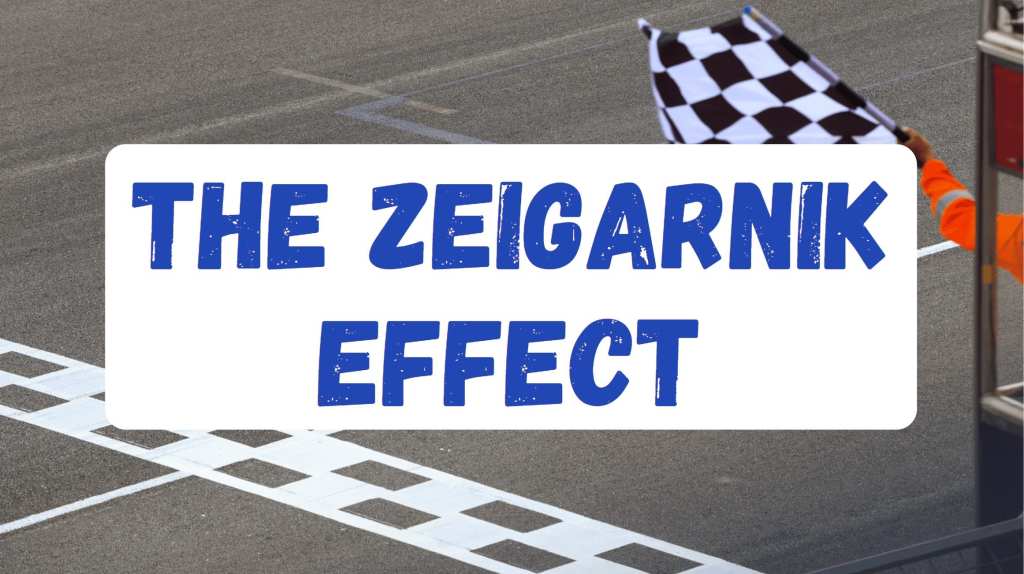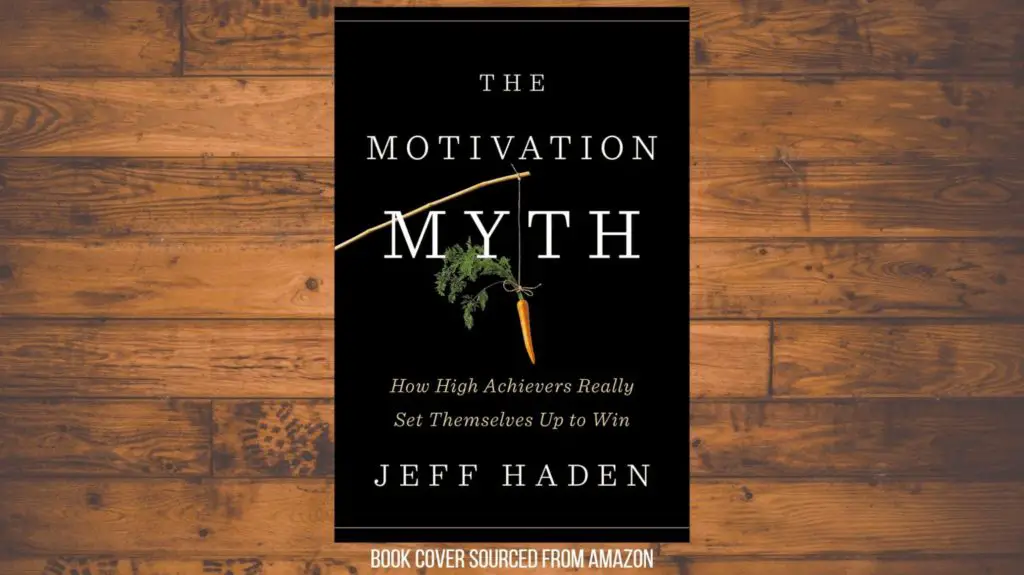This post may contain affiliate links, which means I’ll receive a commission if you purchase through my links, at no extra cost to you. Please read full disclosure for more information.
How do cliffhangers make you feel?
You watch an episode of your favorite series on Netflix just to be set up with a cliffhanger. This leaves you thinking about it for the rest of the week. You NEED to know what happens. You NEED to finish the series.
You may have felt a similar desire for completion when working on a project as well. The project could be a presentation for work, a book you are reading, a painting you have started, or the garden you are looking to finish.
Once you start something, it’s all you can think about until you finish. The urge to complete your garden will nudge you to go back and do it as soon as you can.
There is an explanation to why it’s hard to stop thinking about an uncompleted or interrupted task. The Zeigarnik effect could be taking place and it won’t let you settle down until a task is finished.
WHAT IS THE ZEIGARNIK EFFECT?
The Zeigarnik effect states that failure to complete a task creates cognitive tension in your mind that persists until you complete the task. This tension will keep the thought of the task at the forefront of your mind until there is closure.
This can be detrimental when you are trying to get something off of your mind. However, this psychological phenomenon can work to your benefit as well. The attention and mental effort exerted due to the Zeigarnik effect can be harnessed as a technique for learning and memory.
The Zeigarnik effect was discovered by Russian psychologist Bluma Zeigarnik in the 1920s. She noticed that the waiters in a café were able to recall orders they had not delivered yet. Interestingly, they had a far worse memory of the orders that were already served to the customers.

This implied that we think and remember more about uncompleted tasks than we do about completed tasks.
It would appear that it’s human nature to desire to complete things. We need to finish what we start and we won’t be at ease until it happens.
The dissonance created in our minds when our work is interrupted and uncompleted can be used for studying, memorizing, overcoming procrastination, and other areas of productivity.
Downsides
One downside is that once we finish something, our mind dumps information and it suddenly becomes harder to recall information. For example, imagine you just crammed and studied for your final exam. What happens a few days after you take the exam? You forget 90% of what you studied.
Too much of anything can become a problem. The same goes for your thoughts when you are interrupted and/or fail to complete a task.
Invasive thoughts can fill your mind and reach the point of overwhelming you. This can lead to stress and anxiety. You have probably felt this on the day before a big exam or presentation. Thoughts of the task race through your mind, causing you to stress and even lose sleep at night.
EXAMPLES OF THE ZEIGARNIK EFFECT
Entertainment

We mentioned cliffhangers in the introduction. Great examples of cliffhangers are found in Star Wars and Marvel movies.
The movies will end on a scene that sets up the next movie and leads you to contemplate what the ending could have meant and what will happen in the next movie.
The story is incomplete and therefore, you can’t stop thinking about it. The entertainment industry takes advantage of your need for closure to get you into the theaters to add to their box office numbers.
The same happens in popular book series. You won’t want to stop reading until you finish the series and have closure.
Sports
In sports, athletes are driven to reach their goals and become obsessed with it. In a season, all they can think about is the championship.
The task of becoming a champion is uncompleted and weighs on the minds of the athletes. The drive to complete the task motivates them to train more and train harder. Procrastination is not an option for them.
They set a goal for themselves and will feel dissonance when they are doing things that are not aligned with achieving that goal. Things that don’t align won’t help them complete and finish the job.
School

As for your academics, the Zeigarnik effect can work for you or work against you.
When you are studying for an exam, any interruption of that studying will create tension inside of you that will draw you back to studying more. You won’t be at ease until you have everything down and take the exam.
When you have a speech to deliver, you’ll rehearse the speech in your mind over and over until you finally deliver it.
The constant thoughts running through your mind can help you in learning and remembering material. Both are obviously important in college.
The Zeigarnik effect can work against the student once a task has been completed. Unfortunately, once you take that exam or deliver that speech, you’ll have a harder time remembering the material.
Since you finished, the thoughts of those tasks are no longer at the forefront of your mind. Tension is released and your mind frees itself. The unfortunate byproduct of this is a loss of memory.
Everyday life
Things you do in your everyday life probably fall into the Zeigarnik effect as well. Some examples include:
- Starting a list of chores and feeling the urge to finish them all in one moment
- Reading far more pages of a book than you anticipated because you needed to know what happened
- Going on a first date and overthinking everything after because you don’t know if there will be a second one
- Committing to finish a 12-week diet plan when you are already tired of it in week 4
- Pushing your body to finish your 10 reps when your muscles are giving out on rep 7
These examples have a common thread: each involves a task that is interrupted and/or lacks closure and completion.
Picture yourself in these scenarios listed. Imagine that you get your chores done, secure a second date, finish a diet plan, etc. You probably feel relief and accomplishment by simply imagining it.
TYING IT ALL TOGETHER TO BENEFIT YOUR LIFE
Okay, so we have learned about the Zeigarnik effect and know that we feel tension when we do not finish something. We also know that an unfinished task will stay on our minds until we reach completion and have closure.
We can use this psychological effect to benefit in our lives in many ways.
Learning and remembering

Harness the thoughts in your mind that come from the Zeigarnik effect. If you know that interrupted and uncompleted tasks will remain on your mind, you can utilize this when you are learning and studying.
Rather than complete something in one go, space out the time that you study a subject. Let the information stay on your mind. This will help in remembering the information. If you read your textbook in one day, your completion of it could result in your mind dumping the information out.
Basically, avoid cramming.
Instead, space out your practice, break up study sessions, and use your racing thoughts to reflect on the information. These are actually recommended learning and memory methods discussed in the popular book Make It Stick (see our book review here).
Overcoming procrastination
Procrastination happens when a task has 6 traits.
These 6 traits are discussed in the book The Productivity Project (book review here). You are likely to procrastinate on a task if it is…
- Boring
- Frustrating
- Difficult
- Unstructured or ambiguous
- Lacking in personal meaning
- Lacking in intrinsic rewards
You and I can both relate to procrastination. Nearly everyone can.
The hardest part of doing something is starting it. Since the Zeigarnik effect urges people to complete tasks, you can use this to your advantage by simply getting started with the task you are procrastinating on.
Take a small step to get the task going. Once you start it, you’ll have a desire to keep going and finish it. You’ll get that feeling where you tell yourself “Let me just knock this out of the way real quick. I’m already here working on it. I might as well finish.”
You can do this for tasks you are procrastinating on including chores for your house, a term paper for a class, or meal prepping for the new diet. Getting started is the toughest part of a daunting task. Let the Zeigarnik effect carry you to the finish line after you initiate the start.
Achieving goals

Setting goals and writing them down is known for being effective for personal development. Putting your intentions out there and making a commitment is a good reason why.
This commitment compels you to stick to your word. When you don’t set goals, you have no clear guidance moving you forward.
When you set a goal, you have a target to aim for and the Zeigarnik effect will keep this target on your mind until you reach it.
On the path to your goal, failure of reaching it will create tension within you. Failure or veering off track will make thoughts of the goal pop into your head. This will be a friendly reminder of the goal you set.
Use this to your advantage to create and achieve your goals.
Taking care of your mental health
Intrusive thoughts due to the Zeigarnik effect can become debilitating when they get out of hand. Anxiety and stress can take its toll on your mental health.
You can overcome this with the awareness that anxiety and stress can be reduced once you have closure on tasks in your life. Knock down tasks one by one and witness how much better you feel.
Oftentimes, my to-do list will swell and I’ll feel overwhelmed by what I have to do. Once I begin checking items off of my list, I feel a lot better about myself and productivity. The completion of items frees up my mind and fills me with a sense of accomplishment and motivation to continue.
Use the Zeigarnik effect to take care of your mental health by focusing on the completion of tasks or closure of situations.
For example, you might be driving yourself crazy thinking about how you are going to ask for a promotion and raise at work. This can deplete you mentally and create stress.
Eliminate this by taking action and asking your boss. Don’t contemplate it any longer. Find closure and those thoughts will finally subside.
SUMMARY
The psychological Zeigarnik effect states that it is human nature to feel a desire to complete things. If work is uncompleted or interrupted, tension will build and the thought of a task will remain at the forefront of your mind until you have closure.
This can work for you if you know how to use it correctly. Use the Zeigarnik effect to help you with learning and memory. Also use it to boost productivity, overcome procrastination, reach your goals, and take care of your mental health.
You have likely witnessed this effect many times in your own life. You probably didn’t know that it had a name. Now that you have an awareness of the Zeigarnik effect and what causes it, you can avoid the drawbacks and capitalize on the benefits.



